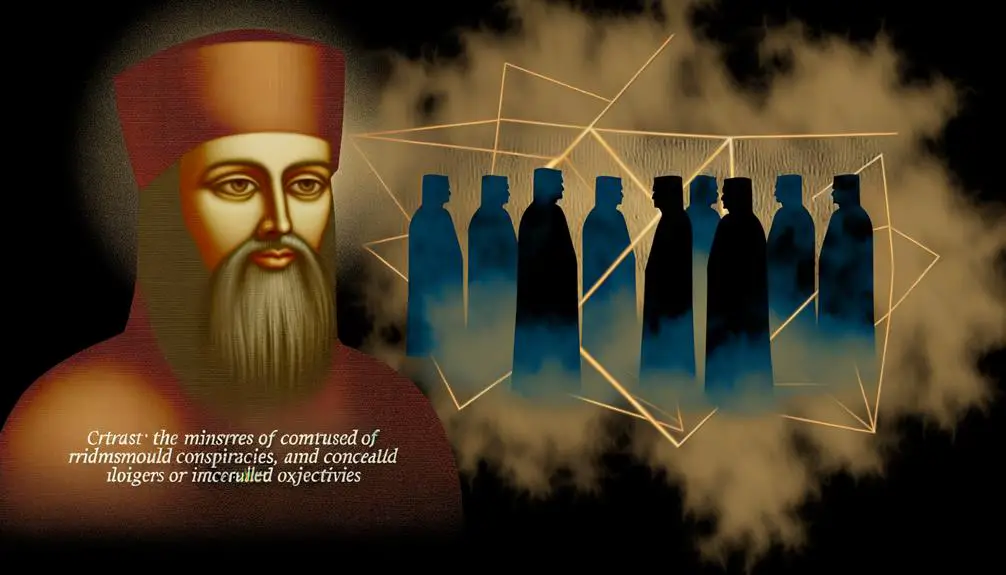Contemplate the multifaceted role of guile in biblical narratives, revealing surprising insights into truth and righteousness.
Meaning of Guile in the Bible
In the tapestry of biblical narratives, isn't guile often the thread that weaves together tales of triumph and tragedy? You'll find that the Bible doesn't shy away from presenting characters with complex motives, employing guile in ways that challenge our understanding of morality and divine guidance.
From the cunning serpent in the Garden of Eden to the strategic wisdom of the Apostles, the concept of guile is multifaceted, inviting you to explore its implications further. As you consider its role, you'll uncover insights into human nature, divine justice, and the perennial struggle between sincerity and deception.
What does this exploration reveal about the nature of truth and righteousness in biblical terms?
Key Takeaways
- Guile in the Bible represents deceitful tactics and manipulative actions, often leading to negative consequences.
- Biblical figures like Jacob, Delilah, and Judas exemplify the use of guile through their actions and betrayals.
- Overcoming guile involves practicing honesty, integrity, and seeking wisdom to foster trust and build stronger relationships.
- Jesus and apostolic teachings highlight the importance of living in truth, sincerity, and avoiding deceit in all aspects of life.
Definition of Guile

In the Bible, 'guile' refers to a form of deceit or cunning that's often employed with the intent to manipulate or mislead others. Delving into the term's etymology, you'll find its roots steeped in Middle English, derived from the Old French 'guile', which means treachery or deception. This linguistic origin underscores the deeply negative connotation of guile throughout historical and biblical contexts.
Analyzing guile's use in biblical texts, it becomes evident that this concept isn't merely about lying but involves a more complex, strategic form of deception. It's a calculated act designed to bend situations or perceptions to one's advantage without regard for truth or integrity. This nuanced understanding is crucial for grasping the moral and ethical landscape of biblical narratives, where the distinction between right and wrong isn't always black and white.
As you consider modern interpretations of guile, it's interesting to observe how this ancient concept finds relevance today. In contemporary discourse, guile is often associated with political or corporate maneuvering, where strategic deception is sometimes rationalized as a necessary evil. This shift in perception reflects broader societal changes in attitudes towards honesty and integrity.
However, scholarly interpretations caution against normalizing guile, emphasizing its potential to erode trust and undermine ethical foundations. From this perspective, understanding guile's biblical roots serves as a reminder of the timeless value placed on sincerity and integrity. It challenges you to reflect on the implications of deceit in personal and public spheres, advocating for a return to principles that prioritize truthfulness over manipulation.
Guile in Old Testament Narratives

As you explore guile in Old Testament narratives, it's crucial to analyze instances that illuminate its complex role within these stories.
You'll encounter Jacob's deceptive nature, Rahab's strategic lie, and the betrayal by Joseph's brothers, each offering a unique perspective on the use of deceit.
These narratives not only reflect the moral and ethical landscapes of their times but also invite a deeper understanding of guile's multifaceted implications in biblical contexts.
Jacob's Deceptive Nature
Jacob's deceptive actions, notably in securing his brother Esau's birthright and his father Isaac's blessing, serve as pivotal examples of guile within Old Testament narratives. You'll observe that his cunning maneuvers not only reflect his personal ambition but also underscore the complex dynamics of family and destiny in these ancient stories.
Jacob's blessings, achieved through deceit, mark a significant turning point, emphasizing the tangible consequences of guile—Esau's loss becomes a central theme. This narrative arc invites you to ponder the ethical dimensions of Jacob's actions. Was his deception justified by its outcomes, or does it highlight a moral ambiguity inherent in his character?
Through this lens, the story of Jacob challenges you to consider the intricate interplay between divine providence and human agency in the pursuit of destiny.
Rahab's Strategic Lie
Exploring another facet of guile within the Old Testament, Rahab's strategic lie to protect the Israelite spies underscores the nuanced role of deceit in achieving divine purposes. This narrative presents a complex interplay of ethical dilemmas and moral ambiguity, where the ends seemingly justify the means.
- Ethical Dilemmas: Rahab's lie confronts readers with the question of when, if ever, deception is justified.
- Moral Ambiguity: Her actions blur the lines between right and wrong, challenging simplistic moral judgments.
- Divine Purposes: Rahab's deceit is instrumental in fulfilling God's plan for the Israelites, suggesting a divine endorsement of her actions.
You're navigating a terrain where guile isn't merely condemned or celebrated but analyzed for its role in the broader tapestry of divine narrative.
Joseph's Brothers' Betrayal
In the saga of Joseph, his brothers' betrayal stands as a pivotal example of guile, weaving a complex narrative of jealousy, deception, and redemption within the Old Testament. This story not only showcases the deep-seated human propensity for deceit in the face of envy but also highlights the profound Forgiveness theme and Reconciliation efforts that follow.
Aspect |
Impact on Narrative |
|---|---|
Jealousy |
Initiates the betrayal, leading to guile. |
Deception |
Facilitates Joseph's sale into slavery. |
Forgiveness theme |
Paves the way for family restoration. |
Reconciliation |
Culminates in Joseph's magnanimous actions. |
Redemption |
Frames the narrative's moral lessons. |
Analyzing this, you see how guile, initially a destructive force, becomes a catalyst for transformation and growth within biblical narratives.
Deception in the Garden of Eden

The story of the Garden of Eden introduces the concept of deception through the serpent's cunning interaction with Eve. This narrative vividly illustrates how guile can manifest and the profound consequences that can follow from succumbing to it. At the heart of this episode are the serpent's persuasion and Eve's curiosity, both of which play pivotal roles in the unfolding drama of deception.
The serpent's approach to Eve is a classic study in guile. It doesn't directly challenge the truth but subtly distorts it, exploiting Eve's curiosity and the human tendency to desire what's forbidden. This act of deception isn't just a mere lie; it's a calculated manipulation designed to undermine trust in divine instruction.
Consider these aspects of the deception:
- The Serpent's Craftiness: It carefully chooses its words to sow doubt, presenting its suggestion not as a direct command but as an open question, inviting Eve to reconsider God's command.
- Eve's Response: Her decision to engage with the serpent, driven by curiosity and the allure of gaining wisdom, demonstrates how easily one can be swayed by the promise of forbidden knowledge.
- The Ripple Effect: The consequences of this act of deception extend far beyond Eve, affecting all of humanity. It serves as a poignant reminder of the far-reaching effects of guile.
In analyzing this story, you're invited to reflect on the complexity of deception and the importance of discernment in facing persuasive, yet potentially misleading, narratives. The Garden of Eden's story isn't just a tale from the past; it's a cautionary tale about the enduring presence of guile in human interactions.
Guile and the Prophets

Throughout biblical narratives, prophets frequently encounter guile, either as a tool they must discern in others or as a temptation they themselves must resist. This dynamic underscores a pivotal theme: the prophet's honesty juxtaposed against the backdrop of human deceit. The prophets, as messengers of divine will, navigate a world rife with deception, leveraging their integrity as a beacon of truth.
Their role necessitates a profound understanding of divine strategies, which often involve discerning the intentions of both allies and adversaries. This discernment isn't merely about identifying lies but understanding the deeper motivations behind them. It's a testament to their commitment to truth, a fundamental aspect of their covenant with God. The prophets' encounters with guile serve as critical evaluations of their character and their adherence to divine commandments.
Consider, for instance, how prophets like Nathan and Elijah dealt with the deceit in their times. Nathan's approach to confronting King David over his transgressions (2 Samuel 12) showcases not just a strategic unveiling of David's guilt but highlights Nathan's adherence to truth, despite the potential risks. Similarly, Elijah's confrontations with the prophets of Baal (1 Kings 18) underscore his unwavering commitment to exposing the truth about God's supremacy, despite the pervasive deceit of idol worship.
These narratives emphasize that the prophet's honesty isn't just a personal virtue but a crucial component of their divine mission. Their ability to navigate through guile, employing divine strategies without succumbing to deceit themselves, marks a profound testament to their role as God's emissaries. Their encounters with guile, therefore, aren't just challenges to overcome but opportunities to affirm their unwavering commitment to truth and integrity.
Jesus and the Question of Guile

Reflecting on the prophets' engagements with guile sets the stage for examining Jesus' own encounters with deceit and his embodiment of truth in the New Testament. As you delve into the scriptures, you'll find that Jesus' interactions and teachings provide a profound insight into guile's redemption and showcase his innocence in a world rife with deception.
Jesus' life and ministry were marked by a stark absence of guile, highlighting his purity and setting a benchmark for moral integrity. This contrast becomes a central theme, illustrating the transformative power of truth in a deceitful world.
- Jesus' Innocence: Throughout the Gospels, Jesus is depicted as the sinless one, whose words and actions are free from deceit. His interactions often reveal the guile in others, while he remains untainted, embodying the perfect example of innocence.
- Guile's Redemption: Jesus' teachings and parables frequently touch upon the theme of sincerity versus deceit. He champions truth and sincerity, offering redemption to those entangled in guile through repentance and faith.
- Encounters with Deceit: Despite being surrounded by deceit, Jesus navigates these challenges with wisdom, often turning attempts of entrapment into lessons on truth and integrity.
In analyzing Jesus' relationship with guile, it becomes evident that he represents the ultimate foil to deceit, his life and teachings serving as a beacon of truth in a world overshadowed by guile. His embodiment of innocence and his approach to redeeming those lost in deceit underscore the profound impact of living a life rooted in truth and integrity.
Apostolic Teachings on Sincerity

Apostolic teachings further illuminate how sincerity serves as the cornerstone of Christian ethics, urging believers to shed guile in favor of transparent truthfulness. Through their letters and actions, the apostles consistently highlighted the crucial role of sincerity in the believer's life, aligning closely with Jesus's own teachings. They understood that honesty rewarded individuals not only in their earthly relationships but also in their spiritual journey, drawing them closer to the divine truth.
The apostles' teachings, encapsulated in various New Testament writings, emphasized truth's power to transform lives and communities. They advocated for a lifestyle free from deceit, where one's words and actions are in harmony with the teachings of Christ. This commitment to sincerity was not just about avoiding falsehood but also about embodying the truth in love, thereby fostering genuine relationships within the Christian community.
To add depth and context to these teachings, consider the following table that contrasts sincerity with guile across several dimensions:
Aspect |
Sincerity |
Guile |
|---|---|---|
Goal |
To foster trust and unity |
To deceive or manipulate |
Outcome |
Strengthens community bonds |
Erodes trust and integrity |
Reflection |
Mirrors Christ's teachings |
Contradicts Christian ethics |
Reward |
Spiritual growth and divine approval |
Temporal gain, eternal loss |
Power |
Builds up individuals and communities |
Destroys relationships and moral fabric |
This analytical exploration of apostolic teachings reveals that sincerity isn't just a moral preference but a foundational element of Christian identity. It's a powerful testament to the transformative impact of living a life anchored in truth.
Overcoming Guile With Wisdom

You'll find that wisdom plays a pivotal role in maintaining integrity within scriptural contexts, acting as a safeguard against the snares of guile. Discerning truth from guile becomes achievable when you apply biblical wisdom, a principle deeply embedded in the teachings of Scripture.
Thus, exploring how to apply this wisdom effectively is crucial for navigating life's moral complexities.
Wisdom's Role in Integrity
In the biblical context, wisdom serves as the cornerstone of integrity, enabling individuals to navigate through and overcome guile. This wisdom isn't merely about possessing knowledge but about applying it in a way that upholds honesty and righteousness, even when faced with the honesty paradox and ethical dilemmas. It's about making decisions that reflect God's will, demonstrating a profound understanding of right and wrong.
- Wisdom equips you to discern motives: Understanding others' intentions helps in identifying and avoiding deceit.
- Promotes ethical decision-making: Wisdom guides you through complex moral landscapes, ensuring actions align with divine principles.
- Enhances personal integrity: By consistently applying wisdom, you embody honesty and moral uprightness, setting a standard for others to follow.
In essence, wisdom is indispensable for maintaining integrity in a world rife with guile.
Discerning Truth Vs. Guile
Navigating the delicate balance between truth and guile requires a deep-seated wisdom that empowers you to discern underlying motives and intentions. This discernment is crucial in a world where words and actions are often cloaked in deceit. To aid in this, consider the following table:
Aspect |
Truth Discernment |
Guile Identification |
|---|---|---|
Motive |
Sincere |
Manipulative |
Consistency |
Across Contexts |
Situational |
Evidence |
Verifiable |
Ambiguous |
Impact |
Constructive |
Destructive |
Understanding these distinctions is pivotal. By examining motives, consistency, evidence, and impact, you're better equipped to distinguish truth from guile. This analytical approach, grounded in scholarly inquiry, enhances your ability to engage with integrity in a world rife with deception.
Applying Biblical Wisdom
Having established the framework for distinguishing truth from guile, it's crucial to explore how biblical wisdom equips us to overcome deceit with discernment. The practical application of this wisdom necessitates an acute sense of moral discernment, anchoring one's actions and decisions in a profound understanding of biblical principles.
- *Seek wisdom through prayer*, asking for the discernment to navigate complex situations and identify deceit.
- *Study scripture regularly*, immersing oneself in the biblical narratives and teachings that exemplify moral discernment and integrity.
- *Foster a community of accountability*, where honest feedback and spiritual guidance reinforce one's ability to distinguish truth from guile.
In adopting these practices, you're not just learning to identify deceit; you're cultivating a lifestyle that prioritizes wisdom and moral discernment in every decision.
Frequently Asked Questions
How Do Contemporary Theologians Reconcile the Concept of Guile With Modern Ethical Standards?
To reconcile guile with modern ethical standards, contemporary theologians delve into the nuances of modern manipulation and ethical relativism.
They argue that today's moral landscape demands a reevaluation of guile's role, suggesting that what was once considered deceitful can, under certain circumstances, align with ethical behavior.
This approach emphasizes the importance of context and the evolving nature of morality, bridging ancient principles with contemporary ethical challenges.
Are There Any Parables or Stories Outside the Bible That Ancient Cultures Used to Illustrate the Dangers or Benefits of Guile Similar to Biblical Narratives?
You'll find that ancient cultures often used fables and myths to explore the concept of guile. These stories, much like biblical narratives, served to highlight both the dangers and benefits of cunning behaviors.
Through the lens of cultural myths and ancient fables, societies communicated values and lessons about deceit and wisdom. Analyzing these tales offers a rich, scholarly perspective on how different cultures historically perceived and contextualized guile.
How Has the Interpretation of Guile in the Bible Influenced Legal Systems or Ethical Codes in Various Societies Throughout History?
You're navigating a labyrinth of tradition and law, where guile symbolism has interwoven itself into historical legislation. This influence isn't just a footnote; it's a cornerstone in shaping societal norms and legal frameworks.
Over centuries, guile's portrayal has prompted societies to embed caution and integrity into their ethical codes, reflecting a deep-seated aversion or respect for cunning.
This evolution reflects a nuanced understanding of guile, impacting legal and moral compasses across cultures.
Can the Use of Guile Ever Be Justified According to Other Religious Texts or Philosophies When Compared to the Biblical Perspective?
When exploring comparative ethics, you'll find that the justification of guile varies significantly.
Unlike the biblical stance, some religious texts and philosophical schools advocate for its use under specific circumstances, emphasizing intention and outcome over the act itself.
This nuanced approach suggests that, in certain contexts, guile isn't inherently unethical but rather a tool that, when wielded wisely, can serve greater moral and societal objectives.
In What Ways Have Artists, Musicians, or Authors Incorporated the Theme of Guile From the Bible Into Their Works, and What Interpretations Do They Offer?
When examining how artists weave guile motifs into their work, you'll find a rich tapestry of artistic symbolism. Like a painter who blends shadows to deepen a scene, creators use these motifs to explore themes of deception and morality.
They don't just replicate biblical stories; they reinterpret them, offering fresh perspectives on age-old dilemmas. Through their lenses, you're invited to see guile not just as deceit, but as a complex human trait.
Conclusion
In conclusion, dissecting the biblical narrative reveals guile as a multifaceted concept, woven intricately into the human experience. From Eden's deception to Jesus's embodiment of sincerity, Scripture challenges us to discern and overcome guile with divine wisdom.
This journey from deceit to authenticity mirrors our own spiritual quests, urging us to shed layers of guile in pursuit of a purer, more genuine existence. Thus, the biblical account serves not only as a historical exploration but as a timeless guide for personal transformation.



Sign up